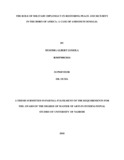| dc.description.abstract | Despite relative consensus on the efficacy of military diplomacy for peace and security, it remains unknown its relative contribution to shortening cycles of civil war and violent conflict and lengthening or prolonging cycles of peace. To this end, this study explored the role of military diplomacy in restoring peace and security in the Horn of Africa region. Specifically, the study investigated the strategies applied by AMISOM in military diplomacy, the role of AMISOM in peace and security through military diplomacy efforts and the key challenges facing AMISOM in military diplomacy in the Horn of Africa. The study was anchored on three theoretical concepts, the theory of collective security, classical liberalism theory and the democratic peace theory. The study adopted an exploratory and mixed methods research design given limited studies within the research subject and allowing the investigation of a broader and complex research problem enabling the researcher to utilize both quantitative and qualitative approaches of data collection. The study target population comprised AMISOM staff and civilian contingent to whom interviews and questionnaires were administered.
The study established AMISOM relied on a broad spectrum of strategies in their military diplomacy efforts although these only realize a little to moderate impact on the restoration peace and security in Somalia. Moreover, the study revealed that while AMISOM military diplomacy efforts are relevant do not yield much on fostering regional peace and security, implying, regional peace and security is multifaceted, requiring multi-stakeholder involvement but largely anchored on peace and stability within the region. Notably, the military diplomacy efforts are mainly constrained by lack of an exit strategy and competing interests among the troop contributing countries. Based on the findings, the study proffers recommendations, first, the need to streamline unity among troop contributing countries that comprise AMISOM that has challenged the implementation of different strategies by the peace and security organization. The study underscores need for engagement with both regional partners, given that peace, security is a multifaceted, and dynamic issue, as well as local government and clan involvement especially for the management of say the airport and port. | en_US |



